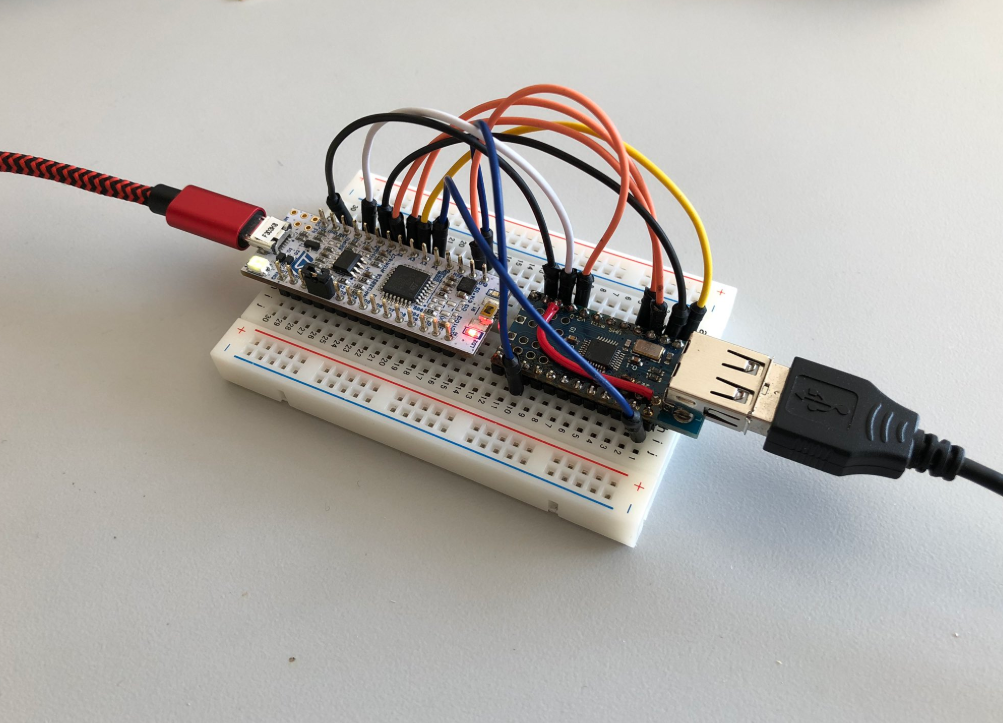Library to use Arduino USB host shield on mbed
ArduinoのUSB Host Shield 2.0をmbedで使えるようにしたライブラリです。
大体のコードがArduinoからそのまま移植可能です。
Arduino UNOやMega用のホストシールド以外にもミニサイズのホストシールドでも使用可能です

シールドについて
3.3VのI/O用にシールドの改造が必要になりますがネット上に記事がたくさんあるのでそちらを参考にしてください
接続例

使い方
Arduinoのコードと違うのはUSBのインスタンスの宣言部分のみです。
ピンを自分で指定できるようにしたので使いやすくなりました。
仕様
- Arduinoのmillis関数、micros関数の移植のために内部でTimerクラスを使用しています。
main.cpp
#include "mbed.h"
#include <PS3BT.h>
#include <usbhub.h>
Serial pc(USBTX, USBRX, 115200);
//Nucleo f303k8用
USB Usb(A6, A5, A4, A3, A2); // mosi, miso, sclk, ssel, intr
BTD Btd(&Usb);
PS3BT PS3(&Btd);
int main()
{
bool printAngle = false;
if (Usb.Init() == -1)
{
pc.printf("\r\nOSC did not start");
while (1); // Halt
}
pc.printf("\r\nPS3 USB Library Started");
while (1)
{
Usb.Task();
if (PS3.PS3Connected || PS3.PS3NavigationConnected) {
if (PS3.getAnalogHat(LeftHatX) > 137 || PS3.getAnalogHat(LeftHatX) < 117 || PS3.getAnalogHat(LeftHatY) > 137 || PS3.getAnalogHat(LeftHatY) < 117 || PS3.getAnalogHat(RightHatX) > 137 || PS3.getAnalogHat(RightHatX) < 117 || PS3.getAnalogHat(RightHatY) > 137 || PS3.getAnalogHat(RightHatY) < 117)
{
pc.printf("\r\nLeftHatX: %d", PS3.getAnalogHat(LeftHatX));
pc.printf("\tLeftHatY: %d", PS3.getAnalogHat(LeftHatY));
if (PS3.PS3Connected)
{ // The Navigation controller only have one joystick
pc.printf("\tRightHatX: %d", PS3.getAnalogHat(RightHatX));
pc.printf("\tRightHatY: %d", PS3.getAnalogHat(RightHatY));
}
}
// Analog button values can be read from almost all buttons
if (PS3.getAnalogButton(L2) || PS3.getAnalogButton(R2))
{
pc.printf("\r\nL2: %d", PS3.getAnalogButton(L2));
if (!PS3.PS3NavigationConnected)
{
pc.printf("\tR2: %d", PS3.getAnalogButton(R2));
}
}
if (PS3.getButtonClick(PS))
{
PS3.disconnect();
pc.printf("\r\nPS");
}
if (PS3.getButtonClick(TRIANGLE))
pc.printf("\r\nTriangle");
if (PS3.getButtonClick(CIRCLE))
pc.printf("\r\nCircle");
if (PS3.getButtonClick(CROSS))
pc.printf("\r\nCross");
if (PS3.getButtonClick(SQUARE))
pc.printf("\r\nSquare");
if (PS3.getButtonClick(UP))
{
pc.printf("\r\nUp");
PS3.setLedOff();
PS3.setLedOn(CONTROLLER_LED4);
}
if (PS3.getButtonClick(RIGHT))
{
pc.printf("\r\nRight");
PS3.setLedOff();
PS3.setLedOn(CONTROLLER_LED1);
}
if (PS3.getButtonClick(DOWN))
{
pc.printf("\r\nDown");
PS3.setLedOff();
PS3.setLedOn(CONTROLLER_LED2);
}
if (PS3.getButtonClick(LEFT))
{
pc.printf("\r\nLeft");
PS3.setLedOff();
PS3.setLedOn(CONTROLLER_LED3);
}
if (PS3.getButtonClick(L1))
pc.printf("\r\nL1");
if (PS3.getButtonClick(L3))
pc.printf("\r\nL3");
if (PS3.getButtonClick(R1))
pc.printf("\r\nR1");
if (PS3.getButtonClick(R3))
pc.printf("\r\nR3");
if (PS3.getButtonClick(SELECT))
{
pc.printf("\r\nSelect - ");
PS3.printStatusString();
}
if (PS3.getButtonClick(START))
{
pc.printf("\r\nStart");
printAngle = !printAngle;
}
if (printAngle)
{
pc.printf("\r\nPitch: %.3lf", PS3.getAngle(Pitch));
pc.printf("\tRoll: %.3lf", PS3.getAngle(Roll));
}
}
else
{
pc.printf("not connect\n");
}
}
}
USB_Host/version_helper.h
- Committer:
- robo_ichinoseki_a
- Date:
- 2020-05-02
- Revision:
- 1:da31140f2a1c
- Parent:
- 0:b1ce54272580
File content as of revision 1:da31140f2a1c:
/* Copyright (C) 2011 Circuits At Home, LTD. All rights reserved.
This program is free software; you can redistribute it and/or modify
it under the terms of the GNU General Public License as published by
the Free Software Foundation; either version 2 of the License, or
(at your option) any later version.
This program is distributed in the hope that it will be useful,
but WITHOUT ANY WARRANTY; without even the implied warranty of
MERCHANTABILITY or FITNESS FOR A PARTICULAR PURPOSE. See the
GNU General Public License for more details.
You should have received a copy of the GNU General Public License
along with this program; if not, write to the Free Software
Foundation, Inc., 59 Temple Place, Suite 330, Boston, MA 02111-1307 USA
Contact information
-------------------
Circuits At Home, LTD
Web : http://www.circuitsathome.com
e-mail : support@circuitsathome.com
*/
/*
* Universal Arduino(tm) "IDE" fixups.
* Includes fixes for versions as low as 0023, used by Digilent.
*/
#define ARDUINO 100
#if defined(ARDUINO) && ARDUINO >=100
#include <Arduino.h>
#else
#include <WProgram.h>
#include <pins_arduino.h>
#ifdef __AVR__
#include <avr/pgmspace.h>
#include <avr/io.h>
#else
#endif
#endif
#ifndef __PGMSPACE_H_
#define __PGMSPACE_H_ 1
#include <inttypes.h>
#ifndef PROGMEM
#define PROGMEM
#endif
#ifndef PGM_P
#define PGM_P const char *
#endif
#ifndef PSTR
#define PSTR(str) (str)
#endif
#ifndef F
#define F(str) (str)
#endif
#ifndef _SFR_BYTE
#define _SFR_BYTE(n) (n)
#endif
#ifndef memchr_P
#define memchr_P(str, c, len) memchr((str), (c), (len))
#endif
#ifndef memcmp_P
#define memcmp_P(a, b, n) memcmp((a), (b), (n))
#endif
#ifndef memcpy_P
#define memcpy_P(dest, src, num) memcpy((dest), (src), (num))
#endif
#ifndef memmem_P
#define memmem_P(a, alen, b, blen) memmem((a), (alen), (b), (blen))
#endif
#ifndef memrchr_P
#define memrchr_P(str, val, len) memrchr((str), (val), (len))
#endif
#ifndef strcat_P
#define strcat_P(dest, src) strcat((dest), (src))
#endif
#ifndef strchr_P
#define strchr_P(str, c) strchr((str), (c))
#endif
#ifndef strchrnul_P
#define strchrnul_P(str, c) strchrnul((str), (c))
#endif
#ifndef strcmp_P
#define strcmp_P(a, b) strcmp((a), (b))
#endif
#ifndef strcpy_P
#define strcpy_P(dest, src) strcpy((dest), (src))
#endif
#ifndef strcasecmp_P
#define strcasecmp_P(a, b) strcasecmp((a), (b))
#endif
#ifndef strcasestr_P
#define strcasestr_P(a, b) strcasestr((a), (b))
#endif
#ifndef strlcat_P
#define strlcat_P(dest, src, len) strlcat((dest), (src), (len))
#endif
#ifndef strlcpy_P
#define strlcpy_P(dest, src, len) strlcpy((dest), (src), (len))
#endif
#ifndef strlen_P
#define strlen_P(s) strlen((const char *)(s))
#endif
#ifndef strnlen_P
#define strnlen_P(str, len) strnlen((str), (len))
#endif
#ifndef strncmp_P
#define strncmp_P(a, b, n) strncmp((a), (b), (n))
#endif
#ifndef strncasecmp_P
#define strncasecmp_P(a, b, n) strncasecmp((a), (b), (n))
#endif
#ifndef strncat_P
#define strncat_P(a, b, n) strncat((a), (b), (n))
#endif
#ifndef strncpy_P
#define strncpy_P(a, b, n) strncpy((a), (b), (n))
#endif
#ifndef strpbrk_P
#define strpbrk_P(str, chrs) strpbrk((str), (chrs))
#endif
#ifndef strrchr_P
#define strrchr_P(str, c) strrchr((str), (c))
#endif
#ifndef strsep_P
#define strsep_P(strp, delim) strsep((strp), (delim))
#endif
#ifndef strspn_P
#define strspn_P(str, chrs) strspn((str), (chrs))
#endif
#ifndef strstr_P
#define strstr_P(a, b) strstr((a), (b))
#endif
#ifndef sprintf_P
#define sprintf_P(s, ...) sprintf((s), __VA_ARGS__)
#endif
#ifndef vfprintf_P
#define vfprintf_P(s, ...) vfprintf((s), __VA_ARGS__)
#endif
#ifndef printf_P
#define printf_P(...) printf(__VA_ARGS__)
#endif
#ifndef snprintf_P
#define snprintf_P(s, n, ...) ((s), (n), __VA_ARGS__)
#endif
#ifndef vsprintf_P
#define vsprintf_P(s, ...) ((s),__VA_ARGS__)
#endif
#ifndef vsnprintf_P
#define vsnprintf_P(s, n, ...) ((s), (n),__VA_ARGS__)
#endif
#ifndef fprintf_P
#define fprintf_P(s, ...) ((s), __VA_ARGS__)
#endif
#ifndef pgm_read_byte
#define pgm_read_byte(addr) (*(const unsigned char *)(addr))
#endif
#ifndef pgm_read_word
#define pgm_read_word(addr) (*(const unsigned short *)(addr))
#endif
#ifndef pgm_read_dword
#define pgm_read_dword(addr) (*(const unsigned long *)(addr))
#endif
#ifndef pgm_read_float
#define pgm_read_float(addr) (*(const float *)(addr))
#endif
#ifndef pgm_read_byte_near
#define pgm_read_byte_near(addr) pgm_read_byte(addr)
#endif
#ifndef pgm_read_word_near
#define pgm_read_word_near(addr) pgm_read_word(addr)
#endif
#ifndef pgm_read_dword_near
#define pgm_read_dword_near(addr) pgm_read_dword(addr)
#endif
#ifndef pgm_read_float_near
#define pgm_read_float_near(addr) pgm_read_float(addr)
#endif
#ifndef pgm_read_byte_far
#define pgm_read_byte_far(addr) pgm_read_byte(addr)
#endif
#ifndef pgm_read_word_far
#define pgm_read_word_far(addr) pgm_read_word(addr)
#endif
#ifndef pgm_read_dword_far
#define pgm_read_dword_far(addr) pgm_read_dword(addr)
#endif
#ifndef pgm_read_float_far
#define pgm_read_float_far(addr) pgm_read_float(addr)
#endif
#ifndef pgm_read_pointer
#define pgm_read_pointer
#endif
#endif